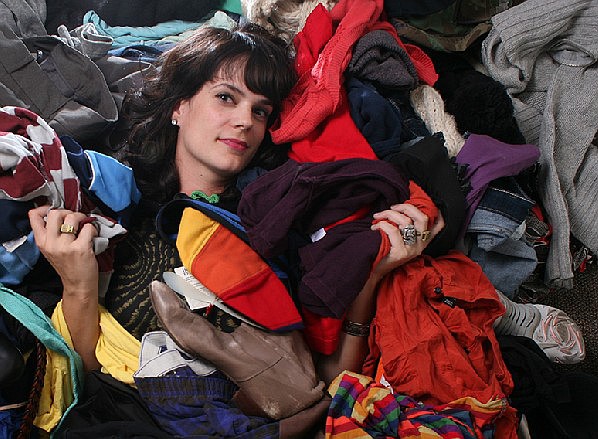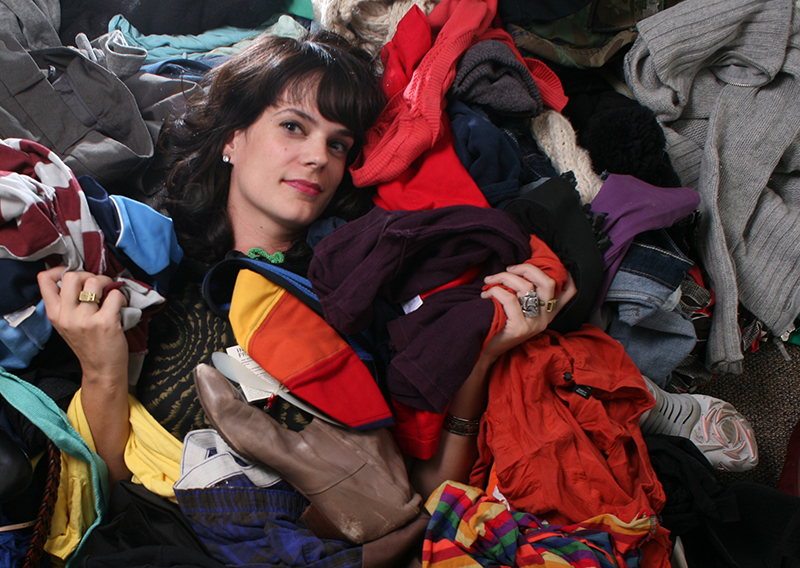'Overdressed' author coming to Dalton to discuss clothing industry, 'slow fashion' movement
Saturday, January 25, 2014
IF YOU GO• What: "Overdressed - The Shockingly High Cost of Cheap Fashion," a discussion with author Elizabeth Cline; a Q&A session and book signing will follow.• When: 6:30 p.m. Thursday• Where: Dalton State College Goodroe Auditorium, 650 College Drive, Dalton, Ga.• Admission: Free• Phone: 706-272-2985Website: www.overdressedthebook.comWHAT IS SLOW FASHION?• Educate yourself about the life cycle of your clothes, from the source of the materials to where they were made.• Buy fewer clothes, and care for the clothes you have to prolong their life.• Alter clothes you have, "upcycle" items to fit your needs• Shop thrift, consignment and vintage stores. Swap with friends, and shop your own closet for forgotten gems.• When shopping, ask yourself if you will really wear the item. Avoid single-wear pieces you'll likely never actually wear.
Ever gotten a clothing deal that was just too good to be true?
You know the kind, the shirt you didn't really need but was too cheap to pass up. Maybe you wear it once, or maybe you forget about it. Maybe it doesn't last past a couple of washes. But it was so cheap, it doesn't really matter.
"The average American buys 68 garments and seven pairs of shoes every year," says Elizabeth Cline, author of "Overdressed: The Shockingly High Cost of Cheap Fashion." "That adds up to about 100 items of clothing, and it's not just limited to people with a lot of money ... When an outfit costs about $20, we buy way more than we need."
While buying more cheap clothes than necessary doesn't seem like a dangerous thing to do in the United States, it has a worldwide ripple effect, she says. Besides leaving behind a huge carbon footprint and supporting unfair wages and working conditions for workers overseas, the problem hits closer to home, according to Cline.
"What I really focused on in 'Overdressed' is the loss of jobs," Cline says. "The textile and apparel industries have changed so much in the last 10 years. We lost several hundreds of thousands of jobs. And that impacts the South as much as any other part of the country. There used to be a much bigger textile economy in this area."
On Thursday at Dalton State College, Cline will speak about how retailers manage to churn out so much trendy clothing at such low prices so quickly and what it means to the larger economy.
Dalton seems an appropriate place for Cline to speak. A textile manufacturing hub, Dalton was one of the hardest-hit metropolitan areas when companies started outsourcing almost all of their labor.
A generation ago, about 1 out of 3 manufacturing jobs in the Chattanooga area were in the textile and apparel industry, but a vast number of which have disappeared as companies either closed down or sent labor to other countries.
Cline, who grew up in Varnell, Ga., and how lives in New York City, had never written about fashion until "Overdressed," which was published in 2012. She came up with the idea after a shopping binge left her with seven pairs of K-Mart shoes for $7 each. She took an inventory of her closet and found hundreds of items she had barely worn.
Browse Target, Belk or other clothing stores and you will find a slew of trendy clothes at affordable prices, marked down drastically after Christmas. The stores want to move the old merchandise out because, in about a month, spring and summer looks will barrel in with a new colony of cuts, prints and styles.
Feeling pressure to keep production costs and prices low, manufacturers are now churning out volumes of clothes at record numbers in quicker succession to sell more and make a higher profit. Fashion seasons used to follow an actual seasonal calendar; now a typical season is around three weeks, Cline says.
Lydia Knight, library director at Dalton State, says the school wanted to bring Cline because she is a regional native whose book holds both regional and national weight.
"Within the school we talk a lot about being green and recycling," she says. "But I find people don't really think that much about clothes. I think an important part of being greener is being more aware of our spending habits."
Two decades ago, American factories were making half the clothing purchased in the U.S., Cline says. These days, almost all the fashion clothes hawked by retail giants are made in other countries, many with cheap materials, poor stitching and questionable labor. But consumers, she says, have the power to vote with their dollars.
"The way that we shop is connected to the economy, and it's connected to jobs when we shop cheap. When we shop cheap, we're basically doing a disservice to our economy," Cline says.
To research her book, Cline travelled to garment factories in China -- once in the disguise of an employee for a fake fashion label. She also interviewed fashion industry executives and went to thrift-store warehouses, where massive amounts of disposable clothing purchases are processed, sold and, more often than most people know, end up being sent overseas to third-world countries, turned into rags or sent to the landfill.
"Overdressed" has received national coverage and become a talking point for the growing "slow fashion" movement, which encourages consumers to choose quality over quantity. To do so, shoppers should be mindful of the "life cycle" of the garment they are buying, from the source of the material to the factory where it was constructed.
Especially after the collapse of a poorly made garment factory in Bangladesh killed more than 1,000 workers in April 2012, the American public has turned a critical eye toward fashion retailers, talking about our shopping habits, labor conditions of overseas manufacturers and an increased interest in local- and American-made clothing.
Giant fashion retailer H&M launched a campaign to raise garment workers' wages and an organic, sustainable line of clothing. Fashion designers like Nanette Lepore have vowed to only manufacturer in the U.S., and local design houses are cropping up everywhere. Cline hopes these trends become the norm in the retail industry.
"We don't need to shop more to change our lifestyles," says Cline. "It's about being selective. I want to empower consumers and change the way we view clothes, and try to think of the whole life cycle of things."
Contact Anna Lockhart at alockhart@timesfreepress.com or 423-757-6578.

